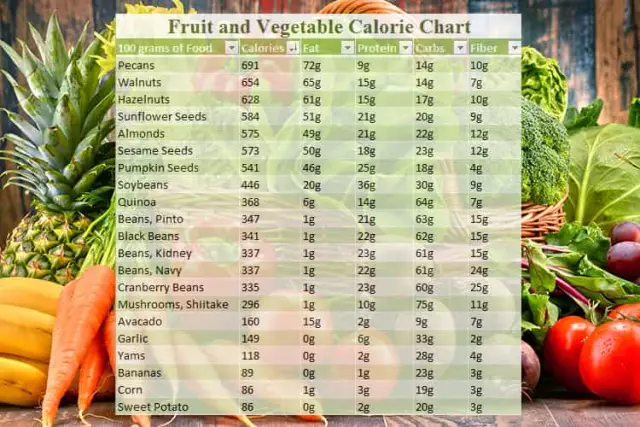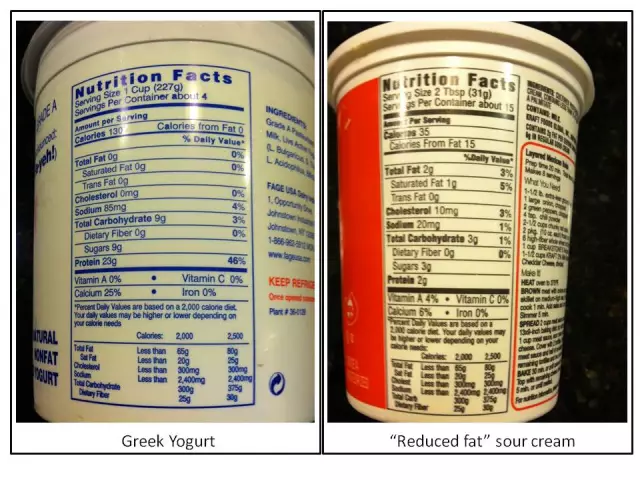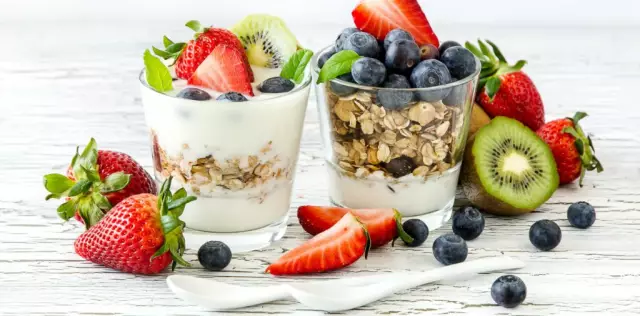- Author Rachel Wainwright wainwright@abchealthonline.com.
- Public 2023-12-15 07:39.
- Last modified 2025-11-02 20:14.
Yogurt

Yogurt is a fermented milk product, which is native to Bulgaria. Yogurt can be liquid, like kefir, and thick, like thick sour cream. The main difference from other dairy products is that the composition of yoghurt contains lactic acid bacteria, which are able to affect the environment in which they enter. Thus, the benefit of yogurt is that lactic acid bacteria maintain the balance of microflora in the intestines. The benefit of yogurt in case of microbial imbalance is that it helps to restore a healthy balance, eliminating dysbiosis.
The classic composition of yoghurt, according to the international quality standard, contains Bulgarian bacillus and thermophilic streptococcus. It is live yogurt, which contains lactic acid bacteria, that contains a lot of vitamins and other useful substances.
Currently, in industrial production, special yoghurt starter cultures are used, which include the following components:
- Bifidobacteria;
- Acidophilus bacillus.
Useful properties, composition and calorie content of yogurt
So, the main functions of this product, entailing positive changes in human health, due to the specific composition of yogurt:
1. Prevents the reproduction of putrefactive bacteria in the intestines;
2. Improves digestion and stomach function;
3. Promotes the cleansing of the intestines from toxins, toxins and feces;
4. Promotes better assimilation of food;
5. Destroys streptococci and staphylococci, typhoid bacillus;
6. Serves as the prevention of infectious diseases;
7. Increases immunity;
8. Facilitates the process of weight loss.
The qualities of the yoghurt starter are due to the presence of such substances in it:
1. Organic acids;
2. Saturated fatty acids;
3. Monosaccharides;
4. Disaccharides;
5. Macronutrients;
6. Microelements.
Yoghurt starter and the resulting product, yoghurt, are an ideal source of calcium. So, in 2 cups of fruit yogurt contains half the daily dose of this trace element for a child and about 30% of the daily dose for an adult.
In terms of the content of potassium in yogurt, it is not inferior to such a valuable source as banana.
In addition to the above, the unique benefit of yogurt is that it helps the body to better absorb vitamins and other nutrients from other foods.
Fruit yogurt is able to restore intestinal microflora and block harmful substances from food, drugs and other sources with which a person has constant contact throughout his life.
Thanks to the addition of a yogurt starter to milk, this product is much better and faster absorbed, especially by an adult body. So, milk is absorbed by adults only by 30 - 32%, but fruit yogurt - by 90 - 92%. Regular consumption of yogurt promotes the early elimination of toxins and toxins through the digestive tract and excretory organs (urine, feces, sweat).
Indicators of nutritional value and calorie content of yogurt:
- Carbohydrates - 8.5 g;
- Proteins - 5 g;
- Fat - 3.2 g;
The calorie content of yogurt with a fat content of 3.2% (basic fat content of milk) is 68 kcal per 100 g of product.
As for vitamins, the list of them in the composition of yogurt is very extensive:
- Vitamin A;
- Vitamin B1;
- Vitamin B2;
- Vitamin B3;
- Vitamin B6;
- Vitamin B12;
- Vitamin C;
- Vitamin PP;
- Choline.
Minerals that make up yogurt:
- Potassium;
- Magnesium;
- Calcium;
- Sodium;
- Sulfur;
- Phosphorus;
- Iron;
- Zinc;
- Fluorine;
- Chlorine;
- Manganese;
- Iodine;
- Chromium.
Thus, yogurt starter is nothing more than a natural antibiotic.
The benefits of yoghurt are low in calories and very high in taste, making it a favorite product of many. Fruit yoghurts can be found in almost every refrigerator today.
Making and using yoghurt

For the production of the product, yoghurt starters are used, which contain special types of bacteria. They are mixed with a milk base, fermented at a certain temperature, fillers are added and packaged - you get liquid fruit yogurt. Thicker fruit yoghurt is obtained when the milk base and starters are mixed directly in the cups. In this case, a special stabilizer is also included in the composition of the yoghurt, giving it the necessary consistency. In order to increase the shelf life and calorie content of yogurt, it can be subjected to heat treatment, which undoubtedly affects the quality of the product - in this case, live bacteria die, and the composition of the yogurt is disturbed. This is how factory production of yoghurt looks like.
Making yogurt at home is a snap. In addition, in this case there is a 100% guarantee that the resulting yoghurt will be natural in composition. It is possible to vary its dietary properties by ourselves: fat milk will provide a high calorie content of yogurt. By adding a portion of warm milk to the natural yoghurt starter and leaving it in a warm place or a thermos, you can get excellent homemade yoghurt. A yogurt maker can facilitate the process. It maintains the optimum temperature, which is necessary for the healthy growth of beneficial bacteria from the yogurt starter. The composition of yogurt and the benefits in this case cannot be compared to those products that are sold in the store.
Doctors recommend that everyone, without exception, eat fruit yoghurts every day. Just 2 cups of fruit yogurt a day provides the human body with everything it needs to produce interferon and other immune defense factors. The benefits of yogurt cannot be overstated.
The low calorie content of yogurt makes it possible to lose weight and keep fit. The benefits of yogurt are especially important for people after antibiotic treatment, while following a diet. Lactic acid bacteria block toxins and other harmful substances that enter the body, preventing them from settling in the form of carcinogens.
Yogurt must be consumed to prevent the following diseases:
- Dysbacteriosis;
- Fungal infections;
- Leukocytosis;
- Cardiovascular diseases;
- Hypertension;
- Increased blood cholesterol levels;
- Lack of calcium;
- Bacterial plaque (tongue, gums).
Candidiasis or thrush in women is nothing more than evidence of a violation of the normal microflora of the genital tract. Therefore, when treating this disease, you must definitely include yogurt in your diet.
From the age of 7 months, babies can begin to introduce this product, made at home using a yogurt starter.
Contraindications and harm
The main reasons for avoiding natural live yogurt are:
- Individual intolerance;
- Doctor's ban (for example, increased acidity of the stomach).
The health hazard is mainly not the natural fruit yogurt itself, but the possibility of choosing a low-quality product. Therefore, you need to purchase healthy yoghurts with a shelf life of no more than 7 days, or cook it yourself at home. When buying a finished product, you need to carefully read the label on the package indicating the composition of the yogurt, paying attention to the presence of lactic acid bacteria and the absence of harmful food additives.
Found a mistake in the text? Select it and press Ctrl + Enter.






